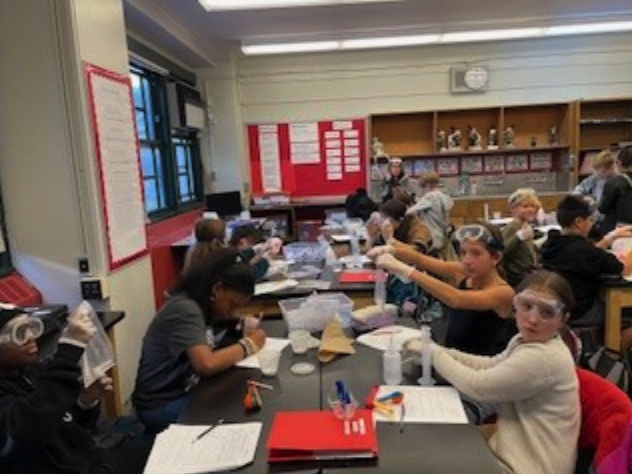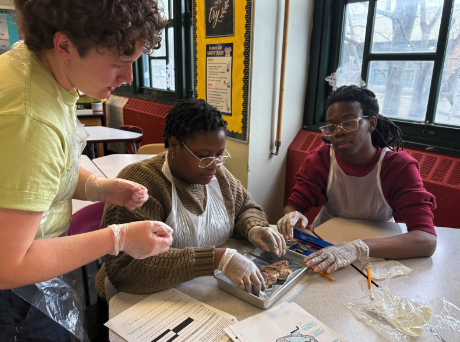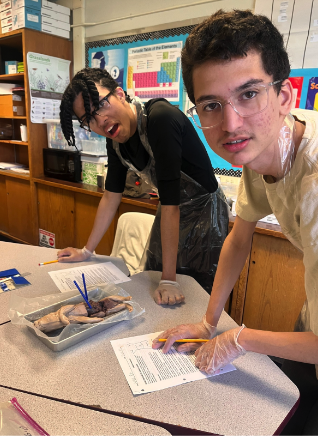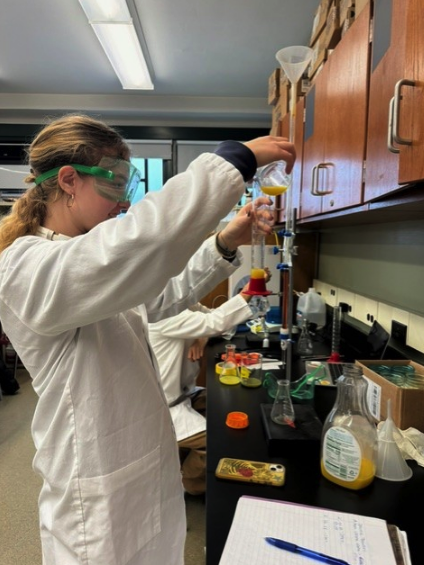Welcome Message and Philosophy:
At BHS, we believe that science is more than just facts and equations – it’s a way of thinking, a process of inquiry, and a means to understand the world around us. Our department is committed to cultivating curiosity, critical thinking, and a love for discovery in all students. We aim to empower students with the skills they need to approach complex problems, think analytically, and contribute meaningfully to the global conversation on science and sustainability.
Through a blend of rigorous instruction, hands-on learning, and interdisciplinary connections, we encourage students to explore, question, and experiment. Above all, we value integrity, collaboration, and a growth mindset, creating a space where all students can develop their potential to become innovative, responsible, and compassionate leaders in science.
Instructional Approach
In science classrooms we foster an inclusive learning environment, employing various differentiated instructional strategies and scaffolding techniques to ensure all learners can successfully comprehend and apply complex scientific concepts. We prioritize culturally responsive pedagogy, connecting scientific principles to students’ diverse backgrounds and experiences, thereby promoting equitable participation and fostering a sense of scientific identity. To further support student academic success, dedicated office hours are provided for individualized tutoring and academic assistance, ensuring every emerging scientist has the necessary resources to excel. Prepare to engage in critical thinking, collaborative problem-solving, and the fascinating pursuit of scientific discovery!
Curriculum Overview/Course Offerings
MYP Year 1 Science (Grade 6)
In this course, we dive into the natural world through hands-on inquiry and project-based learning, using the Amplify Science curriculum to guide our investigations. Students explore diverse phenomena, from thermal energy transfer to population ecology, ecosystems, oceanography, and climate patterns. Key projects include designing alternative energy systems, researching terrestrial biomes, and analyzing climate data, all while developing critical skills in data literacy and scientific inquiry. We also investigate cellular processes, such as photosynthesis, to deepen our understanding of biology and the environment. Families may view the Amplify curriculum by logging
Curriculum Overview/Course Offerings
MYP Year 1 Science (Grade 6)
In this course, we dive into the natural world through hands-on inquiry and project-based learning, using the Amplify Science curriculum to guide our investigations. Students explore diverse phenomena, from thermal energy transfer to population ecology, ecosystems, oceanography, and climate patterns. Key projects include designing alternative energy systems, researching terrestrial biomes, and analyzing climate data, all while developing critical skills in data literacy and scientific inquiry. We also investigate cellular processes, such as photosynthesis, to deepen our understanding of biology and the environment. Families may view the Amplify curriculum by logging on using their child’s school credentials.

MYP Year 2 Science (Grade 7)
The IB MYP Science curriculum fosters the development of science literacy and holistic learning, encouraging students to access a broad range of perspectives and experiences. By building scientific skills and concepts, students will deepen their understanding of the planet and the interconnectedness of life. Throughout the course, students will cultivate the qualities of the IB Learner Profile – becoming Inquirers, Knowledgeable, Thinkers, Communicators, Principled, Open-minded, Caring, Risk-takers, Balanced, and Reflective, while writing and discussing scientific topics. This course integrates the Amplify Science curriculum, a hands-on program that combines investigations, literacy-rich activities, and interactive tools to help students think, read, write, and argue like real scientists. Key units include Microbiology, Metabolism, Plate Tectonics, Futura Engineering Tsunami Research, and Rock Transformations. Families may view the Amplify curriculum by logging on using their child’s school credentials.
MYP Year 3 (Grade 8) Regents Earth & Space Science
Earth & Space Science is the combination of five scientific disciplines: Geology, Meteorology, Oceanography, Environmental Science, and Astronomy. This course will help you improve your problem solving and critical thinking skills. The goal of this class is to increase your scientific knowledge and communication skills, as well as prepare you for the NYS Earth & Space Regents Exam which will be given in June of every school year. Throughout the year we will be implementing many reading assignments, lab experiments, writing assignments, inquiry based learning, and problem-solving scenarios to teach literacy and comprehension in Earth & Space Science.

MYP Year 4 (Grade 9) Regents Biology
Regents Biology is an engaging, concept-driven course that emphasizes the relationships, processes, and mechanisms that define life. Students build critical thinking and scientific literacy through data analysis, inquiry-based investigations, and engineering design, while also developing skills aligned with IB-level expectations. Key topics include cell theory, genetics, evolution, reproduction, homeostasis and immunity, ecosystems, and human impact on the environment. Rather than focusing solely on memorization, the course prepares students to explain, analyze, and interpret complex biological phenomena – skills essential for success on the New York State Biology Regents Exam and beyond.
MYP Year 5 (Grade 10) Regents Chemistry
This course offers a modern and comprehensive introduction to Chemistry, aligned with the New York State Physical Science curriculum. Students explore key chemical principles and concepts while applying their knowledge through hands-on laboratory investigations. A minimum of 1,200 minutes of lab work is required to qualify for the NYS Chemistry Regents Examination in June. In addition to mastering Chemistry content, students will also develop essential study skills to support their success in this course and future college-level academics.
Natural Hazards (Grades 11 and 12 Science Elective; Fall Only)
Natural hazards is a semester-long science class that aims to provide students with an understanding of geological processes, explore the impact these processes can have on humans and analyze strategies for mitigating these hazards. The course will challenge students to think about fundamental questions about the world as well as gain an understanding of the phenomena of our daily lives. Students will complete research, group projects, and hands-on lab experiments. By the end of the course, our hope is that students will be able to think critically about our world and the forces that shape it.
Zoology (Grades 11 and 12 Science Elective; Spring Only)
This course is a semester-long course that discusses the branch of biology that deals with animals and animal life, including the study of the structure, physiology, development, and classification of animals. We also will discuss biodiversity and ways in which biodiversity is being threatened. We will do many labs, dissections and learn about all 9 phyla of the kingdom Animalia.

DP Years 1 and 2 Biology
The IB Diploma Programme Biology Higher Level course aims to provide students with a comprehensive understanding of the living world, from the microscopic to the macroscopic, through various scientific approaches and techniques. Students will have the opportunity to design investigations, gather and analyze data, develop manipulative skills, collaborate with peers, and effectively communicate their findings. The course explores the relationship between structure and function at all levels of complexity, covering topics such as human and animal physiology, plant science, molecular biology, and ecology. In the second year, students deepen their understanding of how scientists work and communicate, engaging in scientific study and creative inquiry within a global context. The course is designed to prepare students for college-level science and the IB External Assessments in Biology. Key aims include developing scientific creativity, applying knowledge of science and technology, honing analytical and evaluative skills, enhancing communication abilities, and fostering a critical awareness of the ethical implications of scientific advancements.
DP Years 1 and 2 Chemistry
IB Diploma Programme Chemistry (Standard and Higher Level) is a two-year course that progresses from Structure to Reactivity, fostering a deep conceptual understanding of the physical world. In the junior year, students explore the particulate nature of matter, bonding, and classification, and engage in a Collaborative Sciences Project to investigate a global issue through science. In the senior year, the focus shifts to Reactivity, covering thermodynamics, stoichiometry, kinetics, equilibrium, and chemical change, including acids, bases, redox reactions, and organic chemistry. Students also complete an Internal Assessment, conducting a self-directed investigation on a topic of personal interest. The course follows the IB Chemistry Guide, incorporating scaffolding, student choice, and culturally responsive teaching, with ongoing support through labs, peer collaboration, and feedback.

Please sign up/accept the invite from your child’s teachers in September for the Toddle app, BHS’ online grading and announcements platform. The Toddle app is how teachers, staff and administrators communicate with families on a regular basis.